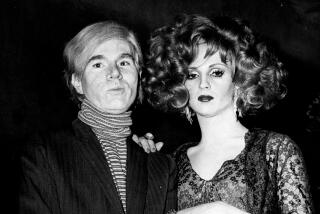BOOK REVIEW / FICTION : A Sweet, Home-Cooked Meal for Our Time : BLUE RODEO <i> by Jo-Ann Mapson</i> ; HarperCollins $22, 318 pages
Jo-Ann Mapson’s new novel, “Blue Rodeo,” is the perfect dessert for women--and men!-- who liked “The Bridges of Madison County” then found they were hungry two hours later: hungry for character development, believable plot, dialogue and language at once controlled, mature, romantic, subtle and memorable.
The bestseller list is where perfectly good novels such as “Blue Rodeo” belong, but something goes awry and they rarely work their way up there. Why “Bridges” then? It’s a minor romance, the perfect length for a flight from Los Angeles to Chicago. It makes you feel like a better person: “I do read love stories,” you protest. “I don’t only go in for sexy thrillers with big body counts.” It’s fast-food fiction.
“Blue Rodeo” is a long, home-cooked meal of a novel, a fully realized piece of writing, balanced in pace and language, a controlled, leisurely work. “The Bridges of Madison County” reads like a movie novelization compared to Mapson’s careful prose construction.
Owen Garrett, the hero of “Blue Rodeo,” is a far more compelling figure than Robert Kincaid, the cardboard hero of “Bridges.” He’s a real cowboy, a 52-year-old man of few words and wants. He’s also a wanted man with a big conscience. He loves his horse, Red-Bow, and his dog, Hopeful. He believes ardently in the work ethic, and knows that there is a difference between a babe and a lady.
Although Owen’s fugitive status forces him to keep a low profile in the tiny New Mexico ranching community he’s settled in, he’s too interested in people and the life around him to assume an existence as a loner. He works in the hardware store and tends a few sheep on a small ranch belonging to an absentee landlord. He doesn’t shy away from becoming friends with various locals, especially Joe Yazzi, a Native American Vietnam vet with terrible physical and emotional scars.
Owen had been married and is the father of a grown daughter. But he hasn’t been romantically intimate with a woman since he’s been on the lam and he’s ripe for it, right there on Page 1:
“To Owen Garret’s keen sheepherder’s eyes, it appeared entirely likely that the woman in the blue shirt and red panties running back and forth between the water faucet and the two copulating dogs was the Californian. First off, the red panties were the itty-bitty lace variety. You didn’t come by those in a town like Blue Dog unless you ordered off one of those fancy color catalogs.”
The Californian in the blue shirt and lace red panties turns out to be Maggie Yearwood, recently divorced from a hotshot Hollywood director. She’s given up a sophisticated lifestyle and ocean-front home just as she’s hit her 40s. Her reasons for coming to live in this backwater ranching community have as much to do with building a new life as living in the state so that her son can attend a boarding school for the deaf as a state resident.
They turn out to be neighbors, Maggie and Owen. She’s rented the ranch house on the property Garrett is caring for, while he occupies the bunkhouse. She’s disappointed at first, having a neighbor so close by. Maggie imagined painting again, in splendid Georgia O’Keeffe-like isolation. Now there’s this guy there, watching her every move. Maggie doesn’t know that Garrett respects her need for privacy, even while setting his sights on her.
Maggie’s troubles--being the recently cast-off wife and rejected parent, being new in the tiny, close-knit community and having her economic status recently lowered--dominate the story, while Owen’s precarious status remains unexplored much of the time. He cannot bring himself to reveal his background to her. It drives you crazy because they are both such utterly, honest people.
How Mapson gets Maggie and Owen to fall in love is touching, humorous and romantic. He initiates romance by proposing that they take a dip in the river on an early autumn evening.
They kiss and everything changes. “That kiss said something she had needed to be reminded of--outside this river, on dry land, where contiguous states bumped each other at their borders and telephone systems chattered all night with orbiting satellites, nothing really mattered except two people in a river, making a night pass by holding on to one another.”
Mapson engineers a subplot about Maggie’s son, Peter, and how he adjusts to living in a silent world. It must be hard enough to enter into the mind of a 15-year-old male, let alone a boy who has recently gone deaf. But the passages in Peter’s voice make compelling, fascinating reading.
A novel like “Blue Rodeo” deserves a little fanfare. No bodies, guns, freeway chases, helicopters or machetes. This is a romantic, elegant, low-keyed Western for our time--with sex scenes you can show your mother.
More to Read
Sign up for our Book Club newsletter
Get the latest news, events and more from the Los Angeles Times Book Club, and help us get L.A. reading and talking.
You may occasionally receive promotional content from the Los Angeles Times.






